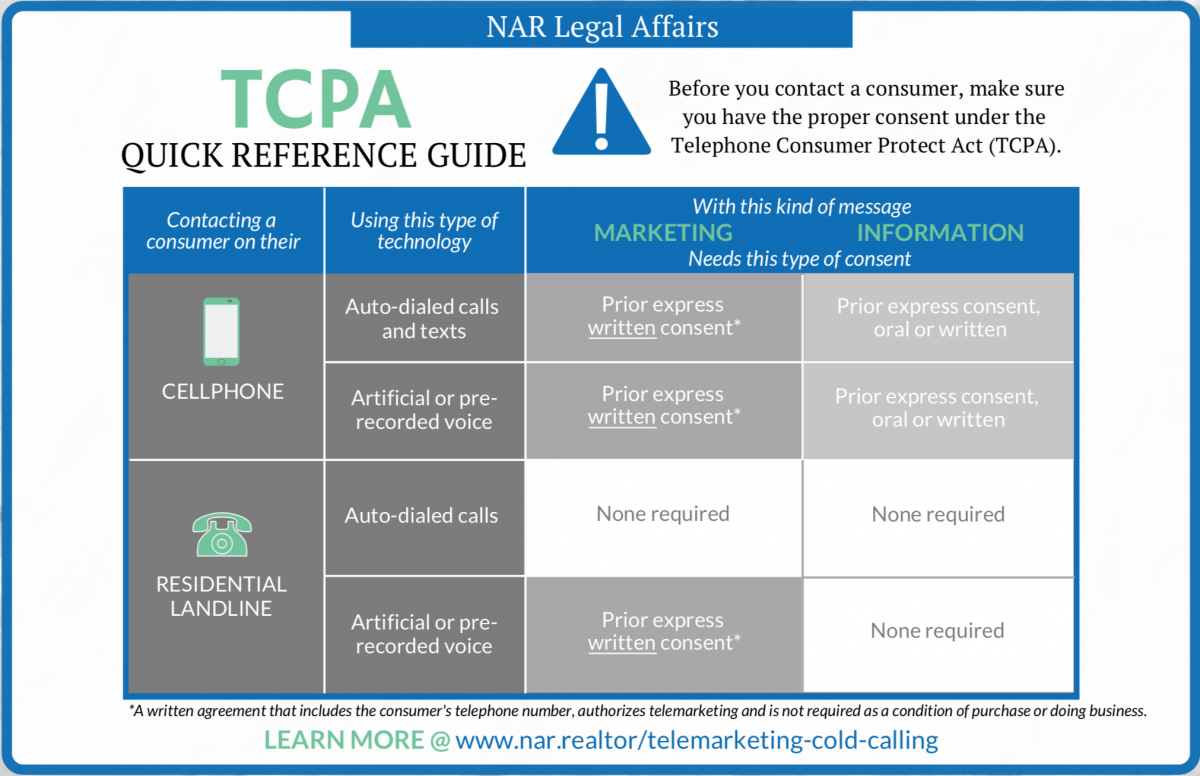References
NAR Library & Archives has already done the research for you. References (formerly Field Guides) offer links to articles, eBooks, websites, statistics, and more to provide a comprehensive overview of perspectives. EBSCO articles (E) are available only to NAR members and require a password.
Telephone Consumer Protection Act (TCPA) Basics
Window to the Law: TPCA Update on Cell Phone Marketing (National Association of REALTORS®, May 3, 2021)
“Real estate professionals may more freely use their cell phones for marketing purposes without fear of violating the Telephone Consumer Protection Act based on a recent U.S. Supreme Court decision that offers clarity on TCPA limitations.”
The Telephone Consumer Protection Act (National Association of REALTORS®)“The Telephone Consumer Protection Act ("TCPA") was signed into law by President Bush on December 20, 1991. The TCPA amended Title II of the Communications Act of 1934 by adding a new section (47 U.S.C. sec.227). While the TCPA acknowledges the legitimate business interests of telemarketers, it recognizes the privacy rights of telephone customers and states that the unrestricted use of telemarketing could be an intrusive invasion of privacy as well as a risk to public safety in some instances.”
The TCPA: Protection Against Robo Calls and Prerecorded Calls (NOLO, 2021)
Understand what constitutes a violation of the TCPA on cell phones and residential phone lines, how violations are documented, and potential damages that may apply for violations.
Telemarketing vs. Informational Calls and Text Messages
FCC Takes Long-Delayed Step Against Spam Text Surge (Axios, Sep. 26, 2022)
“The measure also seeks comment on whether carriers should use third-party analytics providers to inform blocking efforts, and whether the agency should push the wireless industry to authenticate text messages like it does for phone calls to deter robocalls, a senior FCC official told Axios.”
Text Message Laws Every Business Needs to Follow (Business.com, Sep. 1, 2022)
As marketing by text message gains in popularity, it’s important for business owners to understand TCPA restrictions and stay compliant with applicable laws.
Window to the Law: TCPA and Texting (National Association of REALTORS®, Apr. 4, 2018)
“In this edition of Window to the Law, brokerages can learn how to legally text clients under the Telephone Consumer Protection Act.”
Obtaining Consent
‘Wolf of Wall Street’ Jordan Belfort Hit with Class Action Over Alleged Spam Texts (ClassAction.org, Jul. 14, 2022)
“The 19-page lawsuit adds that the automated spam texts sent by Belfort and Global Motivation, his marketing company, did not include a way for recipients to opt out of future messages. The suit claims that the texts have caused consumers “harm, including statutory damages, inconvenience, invasion of privacy, aggravation, annoyance, and violation of their statutory privacy rights.”
Hot Topics in Broker Risk Reduction (National Association of REALTORS®, May 2022)
“Consent is the gold standard to avoid TCPA liability and should must obtained when using technology that employs a random or sequential number generator. Consent should be clearly stated, well documented and preserved.”
The Telemarketer’s Guide to TCPA Consent (Klein Moynihan Turco, Aug. 5, 2021)
“As we have previously detailed, under the TCPA, consumer consent must be obtained by businesses that wish to make robocalls and send text messages to consumers. The consumer’s consent to receive such solicitations must be unambiguous, meaning that the consumer must receive a “clear and conspicuous disclosure” that he/she will receive future calls/text messages that deliver autodialed and/or pre-recorded telemarketing messages; that his/her consent is not a condition of purchase; and he/she must designate a phone number at which to be reached.”
11th Circuit Rejects TCPA "Revocation of Consent" Claim Because Borrower Re-Consented (Business Law Today, Dec. 2020) E
“[D]uring a call with the Servicer to discuss a proposed settlement offer for his consolidated loan, the Customer orally stated that he did not consent to receiving ATDS or pre-recorded messages on his cell phone. However, while still on the same conversation, the Customer submitted a demographic form on the Servicer's website providing his cell phone number (though not a "required field") as consent to such calls.”
Hot Topics in Risk Management (National Association of REALTORS®, Feb. 4, 2019)
“Plaintiff lawyers have created a lucrative business model filing class action lawsuits alleging real estate companies have violated the Telephone Consumer Protection Act, or TCPA, by sending text messages without the recipient’s consent. The TCPA requires prior express written consent before using autodialing equipment to send telemarketing messages to wireless numbers.”
Established Business Relationship Exception (National Association of REALTORS®)
“There are three requirements that apply to sending unsolicited advertising faxes: (1) The sender must have an "established business relationship" with the recipient; (2) The sender must have obtained the customer's fax number through methods described in the legislation; and (3) The sender must provide an opt-out mechanism that meets the Act's requirements.”
Complying With the Do Not Call Registry
Window to the Law: Comply With The Do Not Call Registry (National Association of REALTORS®, Jul. 1, 2019)
Learn how to ensure your phone call marketing plans comply the TCPA’s do-not-call registry restrictions.
National Do Not Call Registry (Consumers)
Consumers may register their phone numbers and report violations.
National Do Not Call Registry (Sellers and Telemarketers)
Businesses may register for access and pay applicable subscription fees.
FAQ: Do-Not-Call Registry (National Association of REALTORS®)
Real estate professionals must comply with the Do Not Call Registry for any cold calling activities. It is important to be aware of any state lists in addition to federal, check the Registry every 31 days, and understand any exemptions that may apply.
Safe Harbor Provision (National Association of REALTORS®)
The safe harbor provision can help protect businesses from lawsuits on Do Not Call Registry violations. In order for safe harbor to apply, a business must show that it has a written plan for complying with the registry, train personnel on the Rules, and maintain a list of telephone numbers that the business can not contract.
Have an idea for a real estate topic? Send us your suggestions.
The inclusion of links on this page does not imply endorsement by the National Association of REALTORS®. NAR makes no representations about whether the content of any external sites which may be linked in this page complies with state or federal laws or regulations or with applicable NAR policies. These links are provided for your convenience only and you rely on them at your own risk.













